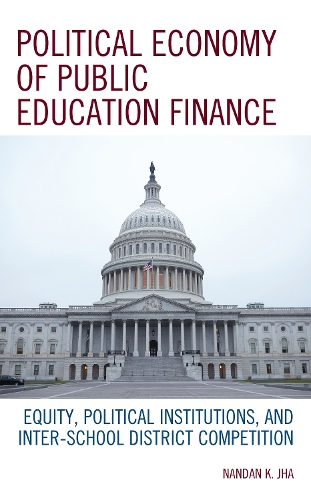
Political Economy of Public Education Finance: Equity, Political Institutions, and Inter-School District Competition
(Hardback)
Available Formats
Publishing Details
Political Economy of Public Education Finance: Equity, Political Institutions, and Inter-School District Competition
By (Author) Nandan K Jha
Bloomsbury Publishing PLC
Lexington Books
22nd June 2020
United States
Classifications
Professional and Scholarly
Non Fiction
Urban and municipal planning and policy
Central / national / federal government policies
379.11
Physical Properties
Hardback
142
Width 161mm, Height 228mm, Spine 17mm
404g
Description
Political Economy of Public Education Finance takes a unique approach in examining distribution of public education spending across urban school districts in the USA. It provides a thorough and rigorous quantitative examination of the joint roles of school choice and political institutions in inequity in school district spending in the USA. This book additionally provides conceptual and empirical treatment to a topic within the vast school choice scholarship that has been studied the least so far: competition among school districts in the urban regional market. The author further offers insight into the role of political institutions in ensuring equity in public school spending. These institutions provide critical leadership in managing inter-school district competition in the regional context. Since equity is in school finance is the outcome of interest in this book, it includes necessary and sufficient attention to the topic too.
Reviews
Jha (Valdosta State Univ.) explores issues of equity, liberty, and efficiency within the political context of school districts in the United States. Even though public schools enroll about 90 percent of US students, and 50 percent of funding comes from state governments, 40 percent from local governments, and about 9 percent from the federal government, there is still a lot of variation in per-pupil support across schools. Policy discussions on school funding are influenced by political ideologies around centralization. Jha notes that although spending on schools has grown five-fold within the last century, the growth in staffing has been in administrative and support personnel, while teachers' salaries remain non-competitive when compared to non-teacher salaries. Using an "Extended Tame Leviathan Model" to analyze nationwide school funding, he concludes that interschool and interdistrict competition does not robustly affect school district funding, that the structure of local political control over schooling affects school equity, that older voters might be encouraged to support schooling if convinced that it would lead to higher social security and Medicare revenue, and that it is in the economic interests of inner-city residents to support policy options for equitable public education spending. Summing Up: Recommended. Graduate students, faculty, and professionals.
-- "Choice Reviews"Author Bio
Nandan K. Jha is assistant professor in the department of political science at Valdosta State University.
